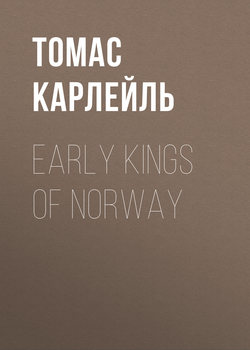Early Kings of Norway

Реклама. ООО «ЛитРес», ИНН: 7719571260.
Оглавление
Томас Карлейль. Early Kings of Norway
CHAPTER I. HARALD HAARFAGR
CHAPTER II. ERIC BLOOD-AXE AND BROTHERS
CHAPTER III. HAKON THE GOOD
CHAPTER IV. HARALD GREYFELL AND BROTHERS
CHAPTER V. HAKON JARL
CHAPTER VI. OLAF TRYGGVESON
CHAPTER VII. REIGN OF OLAF TRYGGVESON
CHAPTER VIII. JARLS ERIC AND SVEIN
CHAPTER IX. KING OLAF THE THICK-SET'S VIKING DAYS
CHAPTER X. REIGN OF KING OLAF THE SAINT
CHAPTER XI. MAGNUS THE GOOD AND OTHERS
CHAPTER XII. OLAF THE TRANQUIL, MAGNUS BAREFOOT, AND SIGURD THE CRUSADER
CHAPTER XIII. MAGNUS THE BLIND, HARALD GYLLE, AND MUTUAL EXTINCTION OF THE HAARFAGRS
CHAPTER XIV. SVERRIR AND DESCENDANTS, TO HAKON THE OLD
CHAPTER XV. HAKON THE OLD AT LARGS
CHAPTER XVI. EPILOGUE
Отрывок из книги
Till about the Year of Grace 860 there were no kings in Norway, nothing but numerous jarls,—essentially kinglets, each presiding over a kind of republican or parliamentary little territory; generally striving each to be on some terms of human neighborhood with those about him, but,—in spite of "Fylke Things" (Folk Things, little parish parliaments), and small combinations of these, which had gradually formed themselves,—often reduced to the unhappy state of quarrel with them. Harald Haarfagr was the first to put an end to this state of things, and become memorable and profitable to his country by uniting it under one head and making a kingdom of it; which it has continued to be ever since. His father, Halfdan the Black, had already begun this rough but salutary process,—inspired by the cupidities and instincts, by the faculties and opportunities, which the good genius of this world, beneficent often enough under savage forms, and diligent at all times to diminish anarchy as the world's worst savagery, usually appoints in such cases,—conquest, hard fighting, followed by wise guidance of the conquered;—but it was Harald the Fairhaired, his son, who conspicuously carried it on and completed it. Harald's birth-year, death-year, and chronology in general, are known only by inference and computation; but, by the latest reckoning, he died about the year 933 of our era, a man of eighty-three.
The business of conquest lasted Harald about twelve years (A.D. 860-872?), in which he subdued also the vikings of the out-islands, Orkneys, Shetlands, Hebrides, and Man. Sixty more years were given him to consolidate and regulate what he had conquered, which he did with great judgment, industry and success. His reign altogether is counted to have been of over seventy years.
.....
Rolf, son of Rognwald,3 was lord of three little islets far north, near the Fjord of Folden, called the Three Vigten Islands; but his chief means of living was that of sea robbery; which, or at least Rolf's conduct in which, Harald did not approve of. In the Court of Harald, sea-robbery was strictly forbidden as between Harald's own countries, but as against foreign countries it continued to be the one profession for a gentleman; thus, I read, Harald's own chief son, King Eric that afterwards was, had been at sea in such employments ever since his twelfth year. Rolf's crime, however, was that in coming home from one of these expeditions, his crew having fallen short of victual, Rolf landed with them on the shore of Norway, and in his strait, drove in some cattle there (a crime by law) and proceeded to kill and eat; which, in a little while, he heard that King Harald was on foot to inquire into and punish; whereupon Rolf the Ganger speedily got into his ships again, got to the coast of France with his sea-robbers, got infestment by the poor King of France in the fruitful, shaggy desert which is since called Normandy, land of the Northmen; and there, gradually felling the forests, banking the rivers, tilling the fields, became, during the next two centuries, Wilhelmus Conquaestor, the man famous to England, and momentous at this day, not to England alone, but to all speakers of the English tongue, now spread from side to side of the world in a wonderful degree. Tancred of Hauteville and his Italian Normans, though important too, in Italy, are not worth naming in comparison. This is a feracious earth, and the grain of mustard-seed will grow to miraculous extent in some cases.
Harald Haarfagr had a good many sons and daughters; the daughters he married mostly to jarls of due merit who were loyal to him; with the sons, as remarked above, he had a great deal of trouble. They were ambitious, stirring fellows, and grudged at their finding so little promotion from a father so kind to his jarls; sea-robbery by no means an adequate career for the sons of a great king, two of them, Halfdan Haaleg (Long-leg), and Gudrod Ljome (Gleam), jealous of the favors won by the great Jarl Rognwald, surrounded him in his house one night, and burnt him and sixty men to death there. That was the end of Rognwald, the invaluable jarl, always true to Haarfagr; and distinguished in world history by producing Rolf the Ganger, author of the Norman Conquest of England, and Turf-Einar, who invented peat in the Orkneys. Whether Rolf had left Norway at this time there is no chronology to tell me. As to Rolf's surname, "Ganger," there are various hypotheses; the likeliest, perhaps, that Rolf was so weighty a man no horse (small Norwegian horses, big ponies rather) could carry him, and that he usually walked, having a mighty stride withal, and great velocity on foot.
.....